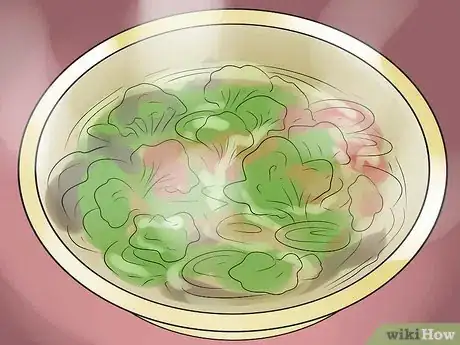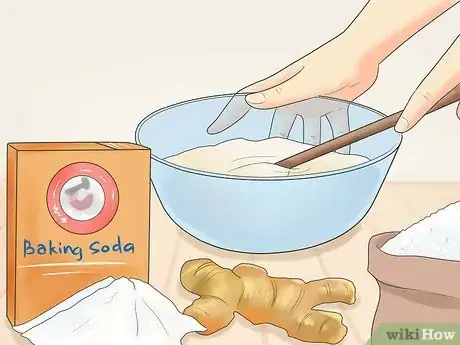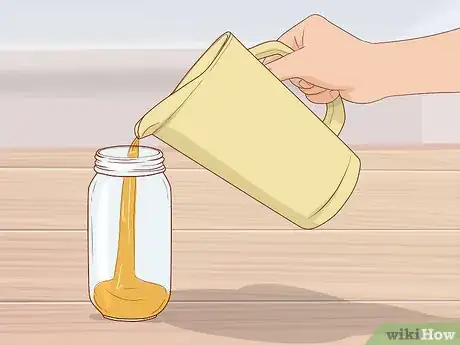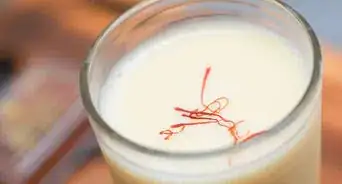This article was co-authored by Julie Brow-Polanco. Julie Brow-Polanco is a Master Herbalist & Certified Aromatherapist with more than 11 years of experience. She is an expert on natural remedies and specializes in using them to support whole-body wellness, particularly immune, digestive, nervous, and reproductive health. Julie earned a Bachelor's Degree in Psychology from Dominican University, a Master Herbalist Certification from The School of Natural Healing, and a Certificate of Aromatherapy from the Pacific Institute of Aromatherapy. Julie is a member of the American Herbalist Guild and a Certified Aromatherapist through the National Association of Holistic Aromatherapy.
There are 16 references cited in this article, which can be found at the bottom of the page.
This article has been viewed 24,098 times.
Adding ginger to your dishes or drinks can give them a kick and boost their nutritional value. Ginger is known for its anti-inflammatory and nausea-reducing properties, and some research suggests that it can even relieve arthritic symptoms. Because ginger is a strong spice, it's best at enhancing a meal's flavor rather than standing as the main dish. Experiment with different ways to eat ginger until you find a recipe you love.[1]
Steps
Flavoring Food with Ginger
-
1Sauté vegetables with minced ginger. If you don't like the taste of plain vegetables, add a little minced ginger to taste. Peel your ginger root to remove the skin, then place it in your frying pan alongside whatever vegetables you choose. Add sautéed vegetables to your favorite stir-fry or soup recipes, or eat it as a dinner side.[2]
- Sautéed vegetables with ginger pair well with chicken or vegetable stock.
-
2Use grated ginger root to give meals an extra zest. Grated ginger can be added to soups, sauces, and salad dressings if you like a mild spice. Grated ginger works well in these dishes instead of minced ginger because of its smoother consistency.[3]
- Tomato-based sauces benefit from ginger's strong taste.
- Add small amounts of ginger at a time to avoid overpowering your food.
Advertisement -
3Eat kimchi for a traditional Korean dish. Kimchi, a spicy Korean dish made with cabbage, is one of the most popular ginger dishes. The probiotics and vitamins in kimchi make it a healthy way to enjoy ginger, especially if you deal with digestive troubles. Kimchi can be eaten alone as a side dish or added to fried rice, eggs, burgers, or stir-fries.[4]
- Many grocery stores or Asian markets carry refrigerated kimchi.
-
4Make spiced desserts with candied ginger. Though often featured in savory dishes, ginger gives baked goods a strong flavor. Muffins, cakes, cookies, and other desserts all pair well with candied ginger in the recipe.[5]
- Pumpkin pie, ginger snaps, gingerbread cookies, and pumpkin bread are all popular desserts made with ginger.
Adding Ginger to Drinks
-
1
-
2Make ginger tea on cold days. While ginger tea can be bought at the store, it is easily made at home. Add a small, unpeeled hunk of ginger to a pot of boiling water and allow it time to steep. Drink your ginger tea with honey and lemon for a sweet, soothing drink.[7]
- Let fresh ginger tea steep for at least half an hour before pouring it.
- Ginger tea can also be enjoyed iced during the summer.
-
3Try ginger ale if you prefer carbonated drinks. Ginger ale can be bought or made, depending on your cooking interests. If you want homemade ginger ale, use already-made ginger tea. Spritz ginger tea with carbonated water, tasting it as you add the water to avoid diluting it.[8]
- Add fresh lime juice to taste.
-
4Put ginger in cocktails for a sharp yet sweet treat. Ginger can make a bland cocktail (or mocktail) perfect for parties. Add ground ginger, ginger ale, or ginger beer to a cocktail that could use extra spice. Cocktails made from citric acid (like grapefruit, lemon, or lime juice) mix well with ginger.[9]
Using Ginger as a Herbal Remedy
-
1Have a ginger drink to relieve nausea and vomiting. Ginger improves your body's digestion and prevents vomiting. Drink ginger tea or ginger ale when ill to calm your upset stomach.[10]
- Ginger drinks are especially useful for easing morning sickness. Unlike some over-the-counter drugs, ginger does not harm the fetus or cause unpleasant side effects.[11]
- The general rule of thumb is 1 teaspoon of ginger to 8 ounces of water. Let it steep, covered, for at least 10 minutes. Then, strain out the herb material and sip it.
-
2Treat inflammation with ginger supplements. Ginger contains anti-inflammatory substances called gingerols, which can ease swelling. Some studies even suggest that taking ginger supplements daily can reduce the risk of colorectal cancer because of its inflammatory relief properties.[12]
- Ginger can help ease joint pain in those suffering from arthritis.[13]
-
3Try candied ginger to prevent motion sickness. If you get ill while driving, going on plane rides, or standing on a boat, candied ginger may relieve your symptoms. Ginger may even work as well as motion sickness medications in relieving symptoms. Take a few pieces of candied ginger with you while traveling in case any symptoms arise.[14]
-
4Drink ginger tea to ease menstrual cramps. Ginger soothes muscles and relieves the intensity of cramps about as effectively as ibuprofen. Drink a cup of ginger tea when suffering from cramps to calm your symptoms. Fresh ginger tea generally works better than packaged tea bags.[15]
-
5Use ginger to boost your immune system during cold or flu season. Ginger both prevents and soothes cold and flu infections by strengthening your immune system. Eat or drink plenty of fresh ginger during cold winter months or if you spend time around someone with a contagious illness.
Expert Q&A
-
QuestionIs eating pickled ginger healthy?
 Julie Brow-PolancoJulie Brow-Polanco is a Master Herbalist & Certified Aromatherapist with more than 11 years of experience. She is an expert on natural remedies and specializes in using them to support whole-body wellness, particularly immune, digestive, nervous, and reproductive health. Julie earned a Bachelor's Degree in Psychology from Dominican University, a Master Herbalist Certification from The School of Natural Healing, and a Certificate of Aromatherapy from the Pacific Institute of Aromatherapy. Julie is a member of the American Herbalist Guild and a Certified Aromatherapist through the National Association of Holistic Aromatherapy.
Julie Brow-PolancoJulie Brow-Polanco is a Master Herbalist & Certified Aromatherapist with more than 11 years of experience. She is an expert on natural remedies and specializes in using them to support whole-body wellness, particularly immune, digestive, nervous, and reproductive health. Julie earned a Bachelor's Degree in Psychology from Dominican University, a Master Herbalist Certification from The School of Natural Healing, and a Certificate of Aromatherapy from the Pacific Institute of Aromatherapy. Julie is a member of the American Herbalist Guild and a Certified Aromatherapist through the National Association of Holistic Aromatherapy.
Master Herbalist & Certified Aromatherapist Sure it is. It is especially good for digestion! To make it, peel and slice fresh ginger into thin slices and pound it lightly to release some of the juices. Pack it down into a quart-size mason jar. Gently heat about one cup of filtered water and add two tablespoons of sea salt. Once it’s dissolved, pour it into the mason jar, making sure there is one inch air space between the covered ginger and the rim of the jar. Cover tightly with the lid and keep it in a dark, room temperature space for about three days. After that, it's good to eat!
Sure it is. It is especially good for digestion! To make it, peel and slice fresh ginger into thin slices and pound it lightly to release some of the juices. Pack it down into a quart-size mason jar. Gently heat about one cup of filtered water and add two tablespoons of sea salt. Once it’s dissolved, pour it into the mason jar, making sure there is one inch air space between the covered ginger and the rim of the jar. Cover tightly with the lid and keep it in a dark, room temperature space for about three days. After that, it's good to eat! -
QuestionWhat is the best way to peel ginger?
 Community AnswerI like to run a spoon under hot water and peel the ginger with the spoon. I find it works very well.
Community AnswerI like to run a spoon under hot water and peel the ginger with the spoon. I find it works very well. -
QuestionAfter boiling root ginger for tea, can I eat the boiled root that is left?
 Community AnswerYes. You may want to peel it, because it can be difficult to digest, but it can be eaten when peeled.
Community AnswerYes. You may want to peel it, because it can be difficult to digest, but it can be eaten when peeled.
References
- ↑ http://www.whfoods.com/genpage.php?tname=foodspice&dbid=72#healthbenefits
- ↑ https://www.betternutrition.com/food-matters/medicinal-foods-garlic-ginger
- ↑ http://www.finecooking.com/article/cooking-with-fresh-ginger
- ↑ http://gundrymd.com/eat-more-ginger/
- ↑ http://www.huffingtonpost.com/2013/11/06/candied-ginger-recipe_n_4220382.html
- ↑ http://food.ndtv.com/food-drinks/7-miraculous-benefits-of-ginger-juice-from-better-digestion-to-beautiful-hair-1685835
- ↑ https://www.thekitchn.com/five-ways-to-eat-fresh-ginger-99287
- ↑ https://www.epicurious.com/recipes/food/views/homemade-ginger-ale-358033
- ↑ http://www.huffingtonpost.com/liquorcom/5-perfect-ginger-cocktail_b_2059159.html
- ↑ http://www.healthyandnaturalworld.com/14-ways-to-use-ground-ginger/
- ↑ http://americanpregnancy.org/pregnancy-health/morning-sickness-relief/
- ↑ https://www.medicalnewstoday.com/articles/265990.php
- ↑ http://www.huffingtonpost.com/leo-galland-md/how-to-fight-inflammation_b_849387.html
- ↑ http://www.organicauthority.com/health/6-ways-to-use-ginger-benefits.html
- ↑ http://www.health.com/health/gallery/0,,20319939,00.html#skin-rejuvenator-0
- ↑ http://www.well-beingsecrets.com/surprising-health-benefits-ginger/#How_to_Store_Ginger
About This Article
If you're unsure how to eat ginger, try frying minced ginger with your mixed vegetables when you make a stir-fry. Alternatively, if you're making soup or salad and want a smoother consistency, grate the ginger to add some mild spice. For a simple ginger drink, add a chunk of unpeeled ginger to a pot of boiling water to make ginger tea. Drink it with lemon and honey for an extra sweet taste. If you'd prefer to drink ginger more naturally, put the ginger in a juicer and drink it as a juice. To learn how ginger can be used as a herbal remedy, including to treat nausea and inflammation, read on!










-Step-10-Version-2.webp)

























































